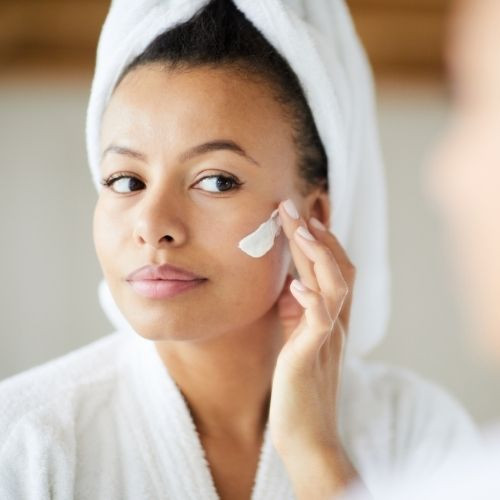The Benefits of Sulfate-Free Skin Care Products
Posted by Nikki Wisher on Jul 16th 2021
July isn’t just a month to celebrate the US’s Independence Day or to spend our weekends at barbecues and parties with friends. As fun as those events may be, July is also Sulfate-Free Month at Skin Elite: a time when we raise awareness about sulfate-free products and their benefits.
You’ve probably heard the term “sulfate-free” everywhere, from shampoo commercials to, well, skin care blogs. But what are sulfates and why might you want to nix them from your daily routine?
What Are Sulfates?
Let’s take a step back in time to chemistry class. Sulfate is a salt that forms from a reaction of sulfuric acid when it combines with another material. When we talk about sulfates in skin care and other personal care products, “sulfates” include any sulfate-based chemical.
In particular, there are two sulfates that are common in personal care products. They are sodium lauryl sulfate (or SLS) and sodium laureth sulfate (or SLES). SLS and SLES are mostly used to make a product lather up or become sudsy, so you’ll often find them in cleansers and cleansing exfoliants.
What Are the Benefits of Sulfate-Free Skin Care Products?
If sulfates create that incredibly satisfying lather that makes you feel like your cleanser is really doing its job, what’s the harm? It turns out that there are a few benefits that await you when you decide to go sulfate-free.
Lower Environmental Impact
Sulfates are on the ever-growing list of products and ingredients that are often damaging to the planet. Some sulfates are made from petroleum, and the process of manufacturing them can add to our planet’s pollution and accelerate climate change. Other sulfates are made from plants, but even these are sometimes sourced in a way that negatively affects the environment.
Reduced Irritation
SLS and SLES have a tendency to be irritating, especially if you have sensitive skin. They can irritate and inflame not only your skin but your eyes, mouth, and lungs in some cases. If you’ve noticed that your skin is irritated often, especially after washing your face, sulfates could be the culprit.
Lower Risk for Acne
Another potential side effect of sulfates is acne. Sulfates have a tendency to clog your pores, particularly if you’re already prone to acne. This can spark an acne breakout or make existing acne even worse – which is ironic considering that facial cleansing is one of the most important ways to manage acne.
Avoiding the Fear of the Unknown
For clarity and accuracy, let’s make sure to be clear that so far, studies have not found any known links between sulfates in personal care products and serious health risks like cancer or hormonal disruption. Studies have shown, however, that sulfates gradually build up in your body with repeated use. Even without evidence of health risks from this buildup, some people are concerned about what we may not yet know about sulfates, so they prefer to avoid the buildup altogether.
How Can I Incorporate Sulfate-Free Products into My Daily Routine?
If you’d like to hop on board the sulfate-free train, you’re in luck, because there are simple ways to make the change right now. Try these easy swaps.
Choose a Sulfate-Free Cleanser
Since sulfates are suds-makers, your cleanser is the most likely product in your skin care lineup to contain sulfates. Check the ingredient list and see if it includes SLS, SLES, or any ingredient that ends in “sulfate.”
If it does, try a sulfate-free cleanser instead like DefenAge’s 1-Step Multi-Cleanse. This cleanser also happens to be vegan, cruelty-free, phthalate-free, paraben-free, dye-free, and hydroquinone-free, so no matter what your ethical or natural skin care preferences may be, this product probably aligns.
Use Facial Tools for More Effective Cleansing
Sulfate-free cleansers don’t lather as much as products containing sulfates, and because we’re all so used to sudsy cleansers, that can make you feel like your cleanser isn’t getting the job done. If you’d prefer to give your cleanser a helping hand, try a tool like the Foreo Luna. This vibrating tool helps to gently massage your cleanser into your skin for a deep refreshment that isn’t rough on your skin.
Update Your Exfoliant
As I mentioned, your cleanser is the most likely culprit in your skin care lineup to contain sulfates, but if you use a foaming or cleansing exfoliator, your exfoliator might also be hiding some sulfates. Take a look at the ingredients label to find out.
If you spot SLS, SLES, or anything ending in “sulfate” among the ingredients, it’s time to switch to a sulfate-free exfoliant instead like the Murad Vita-C Triple Exfoliating Facial.
Making Your Skin Care More Skin-Friendly and Eco-Friendly
Whether you want to go sulfate-free to soothe your skin’s irritation, avoid potential health risks, or protect the environment from further damage, you’re making a positive change that can make a real difference. And what better time to go sulfate-free than during Sulfate-Free Skincare Month?

